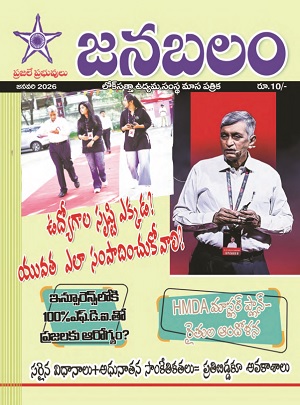The direct and grave indictment of the present Union Telecommunications Minister A. Raja by the Comptroller and Auditor General (CAG) points to a staggeringly-high loss of Rs. 1.7 lakh crores to the public exchequer. This revelation comes in the wake of two other shameful scams: the gross irregularities in the Rs. 70,000 crore - Commonwealth Games (CWG) and the shameful Adarsh Housing Society scam in Mumbai, the latter being carried out invoking the sacred memory of Kargil martyrs.
This is a serious warning sign on two counts:
1. the sheer scale, scope and magnitude of corruption and the consequent loss of massive amounts to the public exchequer and
2. the involvement of politicians at the country’s highest levels.
Essentially, the CAG concluded that the Union Cabinet Minister for IT and Communications ignored advice from the PM and ministries of law and finance, the recommendations of the Telecom Regulatory Authority (TRAI) and allocated 2G spectrum to a select group of other-wise ineligible companies at throwaway prices. The CAG also faulted the Telecom Regulatory Authority of India (TRAI) for its acts of omission and the Department of Telecommunications (DoT) for its gross violations of norms.
Distorted public debate:
Unfortunately, the public debate is at present entirely centered on whether the Union Minister A.Raja has to be sacked or retained, whether such a sacking would change the ruling coalition’s arithmetic or not and likewise. Given India’s track record, the persons involved would likely consider such a ritual ‘political sacrifice’ at the altar of media-driven and coalition-governed politics to satisfy the effervescent public attention, which would then move on to other issues.
While the immediate removal of the tainted minister is a necessary and obvious first step, we should not mistake the trees for the forest. It is imperative that all concerned and guilty persons should be suitably punished through a fast-tracked legal process, given the overwhelmingly conclusive evidence of gross irregularities, likely involving massive bribery and corruption facilitated by blatant misuse of office and abuse of authority.
Real issues must be examined:
Even more important is that we should take a step back and examine the deeper issues impacting the overall welfare of the nation and its citizens. This exercise is absolutely necessary so that not only are the guilty suitably punished, but also the losses to the public exchequer are recouped, punitive damages imposed on the guilty parties and a suitable anti-corruption mechanism is put in place to ensure that no such gross instances of gross corruption take place in the future. The root causes of political corruption must be addressed or else such incidences are bound to recur with greater severity and wreck the Indian economic growth miracle. In this context, we should examine the following hierarchy of issues, principles and priorities:
Tainted Contracts: The 2G-spectrum telecom licenses granted to a select group of favoured companies, which otherwise were totally ineligible for providing telecom services, are quite obviously ‘tainted contracts’. Media reports indicate that CAG pointed out that 12 such ineligible companies secured 85 out of 122 licenses across various jurisdictions in India, for the 2G spectrum.
Corruption, bribery and abuse of authority must be established immediately: While the irregularities in the entire process of granting licenses have been established by the CAG, an independent investigation must be carried out immediately to ensure that the corresponding corruption, bribery, abuse of office and misuse of authority too are established. This body of evidence must form the foundation for a fast-tracked criminal prosecution and punishment of all concerned persons, in both government and outside. At present, India does not have such a fast-responding and effective investigative, prosecution and judicial redressal system to fight serious corruption (see below).
Tainted contracts should be scrapped immediately: Parallel to the above investigation, the Union government should immediately undertake a comprehensive, unbiased and transparent review of the entire 2G spectrum licensing policy and process, based on the CAG’s report. Any 2G spectrum licensing contract that is established to be obtained on the basis of corruption and bribery or abuse of office and authority and in violation to the government’s norms should be declared as null-and-void; they were obtained illegally and therefore are unenforceable. Hence they should be scrapped.
Internationally, in most legal systems, transactions tainted by bribery or corruption are considered illegal and unenforceable. Even in India, in 2007, the Indian Army did not hesitate to scrap a $600 million-worth deal for 197 helicopters with Eurocopter, the world’s largest maker of civil and military helicopters (and a subsidiary of EADS, the European defence and aerospace group), following the Central Vigilance Commission (CVC)’s criticism of the bidding process and illegal use of middlemen, violative of the existing policy of prohibiting middlemen in military deals. The Army subsequently went in for a fresh and open bidding process.
Spectrum, a scarce and precious national resource, belongs to us Indians: It should not be forgotten that the 2G spectrum ultimately is a scarce and precious national resource. The granting of licenses to cellular operators is merely a privilege granted by the sovereign Indian government, entirely on a discretionary and temporary basis.
Now that several ineligible companies were granted these licenses through acts of bribery, corruption, abuse of authority and office, the corresponding 2G spectrum has to be taken back by the government. It can be handed over in the interim to the BSNL, a hugely credible and successful public sector telecom company, for ensuring the smooth continuation of cellular/mobile phone operations. This top-tier redressal arrangement would guarantee that, we, the ordinary consumers are not inconvenienced and do not lose out on the present and easily-accessible cellular phone services. This spectrum can be subsequently allotted to various operators, de-novo, through a transparent, proper licensing process that benefits the consumers as well as the public exchequer.
Recovery of loss to the public exchequer: Simultaneously, punitive damages must be imposed on the guilty parties and the monies should be recovered from them. Towards this, all ill-gotten wealth earned through illegal means should be seized and confiscated by the government and deployed for public good.
The present law against corruption and its application suffer from several lacunae including absence of effective provisions for forfeiture of property of corrupt public servants, dilatory processes because of overload of criminal cases in courts, political control of investigative agencies, weak prosecution, and legal requirements of prior sanction of prosecution of public servants accused of corruption.
The various Committees and Commissions constituted by the State and Union Governments have reiterated the need to amend the Prevention of Corruption Act (PCA), 1988. The 166th Law Commission Report, the 2nd Administrative Reforms Commission’s 4th Report amongst others have made key recommendations in this context. A suitable law is urgently required to amend the PCA in order to make it more effective in fighting the menace of corruption.
In addition, a legislation is needed to eliminate multiplicity of agencies dealing with wrong doing of public servants, to strengthen the institution of Lok Ayukta and sharpen its jurisdiction, and make elected and appointed public servants more accountable.
Towards this, the Prevention of Corruption Amendment Bill (2009) has already been prepared and submitted to the AP Legislative Assembly by Dr. Jayaprakash Narayan (AP MLA). The traditional parties must act now to enact this law.
Strong anti-corruption mechanisms and institutions need of the hour: Plundering the public exchequer for private gain has been the favourite pastime of unscrupulous crooks, often in collusion with politicians and officials entrusted with the responsibility of protecting public good. This corruption disease has reached epidemic proportions in India. Our existing and regular statutory, investigative, prosecution and judicial systems are able to cope with this tidal wave of corruption.
Time for a False Claims Act in India: The False Claims Act in the US is an excellent example of innovation to prevent and detect fraud and corruption. Under this law, any person can unearth fraud or false claims (such as the ones made for organizing the Commonwealth Games), and file suit on behalf of the US against those who have falsely claimed federal funds for any procurement of goods, works or services. Such a whistleblower who files successful suits (called ‘Qai tam’ suits) can recover 15 - 25% of any settlement or judgment reached in a case if the government intervenes in the action, or up to 30% if they pursue it on their own. Private citizens thus have an enormous incentive to detect false claims and corruption and file suits. Consequently, a huge industry of unearthing false claims has sprung up, and hundreds of false claim suits are filed every year. Since then, 4000 such suits have been filed, resulting in $6 billion recovered. In addition, $4 billion was recovered in government-initiated claims. In all such cases, a person making false claim is liable to 3 times the amount of damages sustained by the government, plus a civil penalty.
It is high time we enacted similar laws providing incentive to citizens to unearth fraud and corruption. There are practical, simple, effective methods to set things right. Sensible laws and effective legal system to enforce them are crucial to prevent public fraud.
Independent and empowered Anti-corruption mechanism for India.
We need to create a strong, independent, empowered Lok Pal with adequate resources. The CVC and CBI should function within the purview of Lok Pal. The anti-corruption wing at national and local levels should be completely independent of political and partisan control. They should be under Lok Pal / Lok Ayuktas, similar to the Independent Anti-Corruption Commission (IACC) created in Hong Kong in 1974. The Anti-corruption law should be tightened as recommended by the Second Administrative Reforms Commission. There should be independent prosecutors drawn from judiciary to prosecute corruption cases. Special Courts, confiscation of property and swift justice should be the essential ingredients of our anti-corruption strategy.
The recent scams and the resultant public outrage should lead to tangible institutional and legal outcomes as suggested above. Only then can India move forward, and build a strong economy and mature democracy of which we can be justly proud.
Sunday, November 14, 2010
Time to end the scourge of corruption
Subscribe to:
Post Comments (Atom)





should burn these bastards ... politicians should be considered as modern untouchables
ReplyDeleteHey you dont need to burn these .. You need make the system proper and the system would work for you. Just the way the countries like canada and US are working now.
ReplyDeleteThey have corruption definitely but they would eventually cannot make corruption at this large scale at the expense of tax payers.
Hi All
ReplyDeleteWe need Bhagat Singh, Chandra Shekhar etc. to eliminate these suckers and send the Manmohan a Paki and Sonia an Italian back to where they belong.
These two and all their pimps man should not be ever allowed to rule our land.
Bikram Betal
if people poll votes for 100rs note,one likkar packet and one biriyani packet then this type of candidates only elected.
ReplyDelete